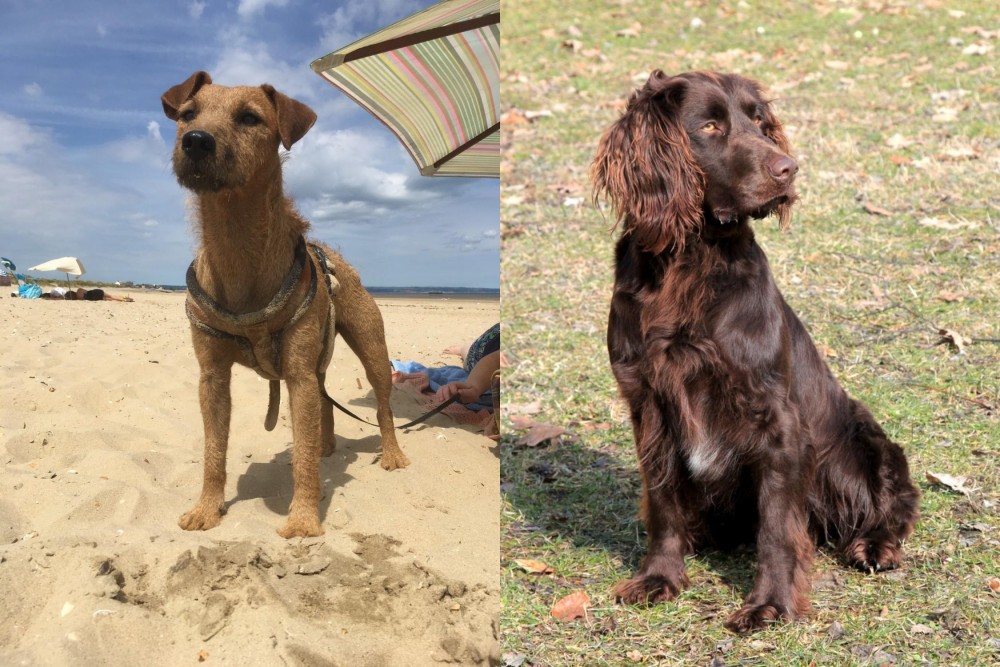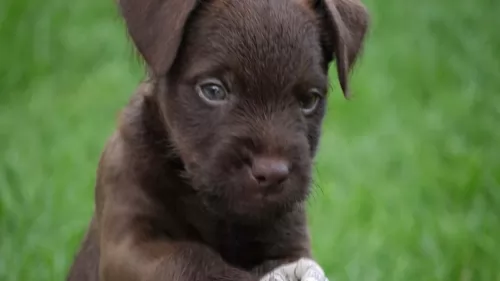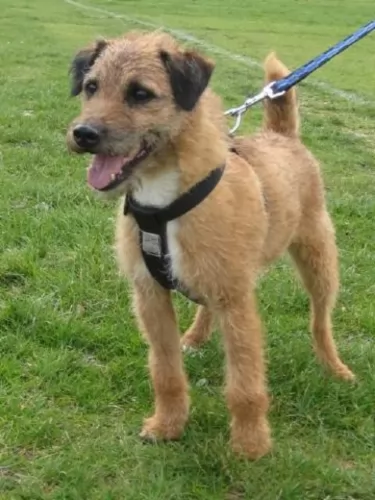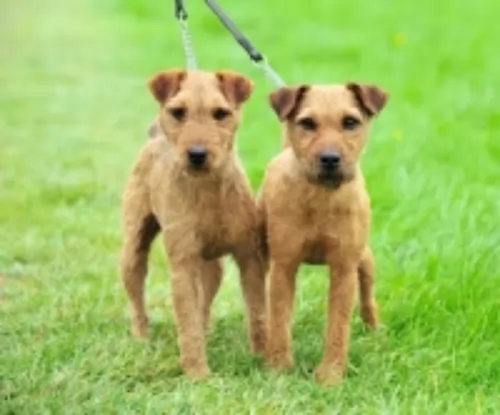 Petzlover
Petzlover Fell Terrier is originated from United Kingdom but German Spaniel is originated from Germany. Fell Terrier may grow 16 cm / 6 inches shorter than German Spaniel. Fell Terrier may weigh 16 kg / 35 pounds lesser than German Spaniel. Both Fell Terrier and German Spaniel has almost same life span. Both Fell Terrier and German Spaniel has same litter size. Both Fell Terrier and German Spaniel requires Moderate Maintenance.
Fell Terrier is originated from United Kingdom but German Spaniel is originated from Germany. Fell Terrier may grow 16 cm / 6 inches shorter than German Spaniel. Fell Terrier may weigh 16 kg / 35 pounds lesser than German Spaniel. Both Fell Terrier and German Spaniel has almost same life span. Both Fell Terrier and German Spaniel has same litter size. Both Fell Terrier and German Spaniel requires Moderate Maintenance.
 Fell terriers, known by other names such as Lakeland-, Patterdale-, Red Fell or Black Fell Terrier are small working terriers, hailing from the fell or hilly country of northern England.
Fell terriers, known by other names such as Lakeland-, Patterdale-, Red Fell or Black Fell Terrier are small working terriers, hailing from the fell or hilly country of northern England.
Several breeds have been developed from the Fell terrier, of which the Patterdale Terrier, Lakeland are some as well as other locally developed breeds. All these particular breeds are sometimes referred to as the Fell Terrier, and in fact the National Terriers Club LLC has published a Fell Terrier standard.
It is also believed that the long legged Fell Terriers may have descended from an old type of terrier referred to as the rough-coated Black and Tan. The Black and Tan Terrier is now extinct but was drawn into The Kennel Club as the Welsh Terrier.
 Looking like a smaller version of the Red Setter, the German Spaniel, known also as the Deutscher Wachtelhund or German Quail Dog, hails from Germany.
Looking like a smaller version of the Red Setter, the German Spaniel, known also as the Deutscher Wachtelhund or German Quail Dog, hails from Germany.
It isn't a new dog breed and in fact it was developed around 1890 already. Used as a hunting dog, the German Spaniel isn’t well known outside of Germany, but it was recognized by the United Kennel Club in 1996.
There are a number of breeds which feature in the development of the German Spaniel, and one of the more prominent dog breeds used for the modern day German Spaniel is the extinct Stoeberer. The Stoeberer was crossed with water dogs and sporting spaniels to bring about the modern German Spaniel as we know it today.
It was in 1903 that the dog was recognized as a breed, and in the 1960s and 1970s the dogs were imported into the United States.
 Small and feisty, the Fell Terrier is a working dog used for hunting purposes. He stands at roughly 31cm to 38cm in height and ways between 6 to 9kg.
Small and feisty, the Fell Terrier is a working dog used for hunting purposes. He stands at roughly 31cm to 38cm in height and ways between 6 to 9kg.
The dogs were sought after for their hunting skills as being the small dog they were, and with their narrow chests, they were able to move around in small, narrow underground tunnels.
The Fell has long legs, and his coat is shortish but with a rough texture to it. The coat is found in different colors such as white, black and tan, chocolate, red, black and bronze. The ears are medium length and floppy while the tail of the dog is traditionally docked, but these days the tail is often left long, and then he becomes less distinctive.
Used to having hunted in packs, the Fell Terrier has always been used to getting along well with other dogs. He makes a fantastic family pet and will get on well with children who have been been taught to respect animals. He is an independent, strong-willed dog and will certainly need socialization and training to turn him into an obedient dog.
He is energetic, fearless, strong-willed, determined and always ready for a game or some form of action.
 As a medium-sized, muscular dog which stands at roughly 45cm to 54cm in height and weighs 18 – 25kg, the German Spaniel is a sporty gun dog who has a long back in relation to his height.
As a medium-sized, muscular dog which stands at roughly 45cm to 54cm in height and weighs 18 – 25kg, the German Spaniel is a sporty gun dog who has a long back in relation to his height.
The ears are long and floppy with wavy or curly hair that will need to be attended to so as to avoid matting.
He has a long, wavy or curly weather-resistant coat, being short on the head but with feathering around the legs and stomach. Color of the coat includes brown, reddish brown and white. The white markings can be found on the chest of the dog, the legs, tails and muzzle. `
The German Spaniel loves to work and be busy and if he can be included in his human family’s activities, then so much the better. He is a social dog and gets on well with other dogs as well as children in the home. The German Spaniel is an intelligent dog and easily trained. In fact training and socialization are important for him, making him obedient and a pleasure to have around.
 The Fell Terrier still has dreams of the hunt in him and with his strong prey instincts, he isn’t really suited to city living, but will fit ideally into life in the country.
The Fell Terrier still has dreams of the hunt in him and with his strong prey instincts, he isn’t really suited to city living, but will fit ideally into life in the country.
He is a high spirited, working dog with an endless amount of energy. He bonds closely with his human family, and for all his robust, larger-than-life attitude and boldness, when he is with his human family he can be gentle, calm and loving, just thriving on the love he receives.
Your Fell Terrier is just waiting to be your best friend and a never ending source of unconditional love.
 The German Spaniel makes a wonderful family pet. He is friendly and sociable, getting along well with just about all dogs and people. He loves his human family, wanting to be involved in all their activities.
The German Spaniel makes a wonderful family pet. He is friendly and sociable, getting along well with just about all dogs and people. He loves his human family, wanting to be involved in all their activities.
He is an active dog, used to hunting and being outdoors and he will therefore require a good deal of exercise from his owners, otherwise he becomes bored and frustrated and even destructive.
He is an adaptable dog, living in the city or the countryside, but wherever he is, exercise is important. Docile and non-aggressive, he has got all the characteristics that make him a splendid family pet.
 Caring for your Fell Terrier requires knowing what do do with him when he develops certain common dog illnesses. He is a robust dog and is not likely to get any serious illnesses, but still you want to know about some of the more common ones.
Caring for your Fell Terrier requires knowing what do do with him when he develops certain common dog illnesses. He is a robust dog and is not likely to get any serious illnesses, but still you want to know about some of the more common ones.
If you suspect an illness, get your pet to the vet who can provide you with a treatment plan for your dog.
Your Fell Terrier can easily fall prey to dental disease if you don't brush his teeth at least 2 or 3 times a week. Unfortunately bad teeth isn't just a case of losing a tooth or two, bad teeth can cause serious diseases such as kidney disease. Tarter build-up progresses to infection of the gums as well as roots of the teeth. So serious is dental disease that your dog can actually have his life shortened.
Your Fell Terrier is a small dog and obesity can easily creep up if you don't control your pet's diet. Obesity is a serious illness that can increase problems with the joints and digestion.
 Health problems are fairly unknown with the robust German Spaniel, and if well cared for, he can reach 12 to 15 years of age.
Health problems are fairly unknown with the robust German Spaniel, and if well cared for, he can reach 12 to 15 years of age.
There are always one or two hereditary health concerns, and the health issues that affect the breed the most are hip dysplasia, skin allergies and splayed feet.
The American Kennel Club tells us that this type of foot is flat, with spreading toes. It is a fault in your pet because it doesn’t support his weight well, causing health problems later on for your pet. This is why it is so important to have your pet’s nails clipped from time to time, because long nails can turn a good paw into a splayed one, actually injuring the tendons.
 Your Fell Terrier is an active dog who won’t thrive if he is cooped up and ignored. He thrives on action and will need to be taken on walks with you and involved in all your games and sports, such as when you go jogging, swimming or cycling.
Your Fell Terrier is an active dog who won’t thrive if he is cooped up and ignored. He thrives on action and will need to be taken on walks with you and involved in all your games and sports, such as when you go jogging, swimming or cycling.
Feed your Fell Terrier the best quality commercially manufactured foods if you opt to feed your pet this way. Include cooked brown rice, vegetables and chicken into his kibble from time to time and always ensure there is cool, fresh drinking water available to him.
It depends on whether your Fell Terrier has a short, smooth coat, or the longer-haired coarse coat. He will certainly need brushing twice a week and sometimes, with the longer coats, he may require professional trimming or stripping.
Always check nails, in and outside the ears and remember to brush his teeth with canine toothpaste and toothbrush twice a week at least.
 Shedding quite heavily and seasonally, the German Spaniel’s thick coat will require being brushed twice a week to keep it shiny and healthy. He loves the attention you give him at the same time.
Shedding quite heavily and seasonally, the German Spaniel’s thick coat will require being brushed twice a week to keep it shiny and healthy. He loves the attention you give him at the same time.
There are some German Spaniel owners who like to take their dogs in for professional grooming, requesting that the coat be cut short all round.
The long ears of your German Spaniel, especially if your pet spends a lot of time swimming, can be permanently damp, picking up dirt easily. Check inside the ears and make sure they are dry and clean to prevent ear infections.
Make sure to brush his teeth 2 or 3x a week as well because plaque build up leads to dental disease but it also negatively affects other body organs too, shortening your pet’s life.
Every dog, just like any human being, requires good nutrition, fresh water and warm, dry sleeping facilities to remain happy and to give him a good chance at longevity.
Apart from the very best commercially manufactured dog foods, ensure he occasionally gets some raw meat in as well as some cooked brown rice, vegetables and chicken. These can be added into his kibble.